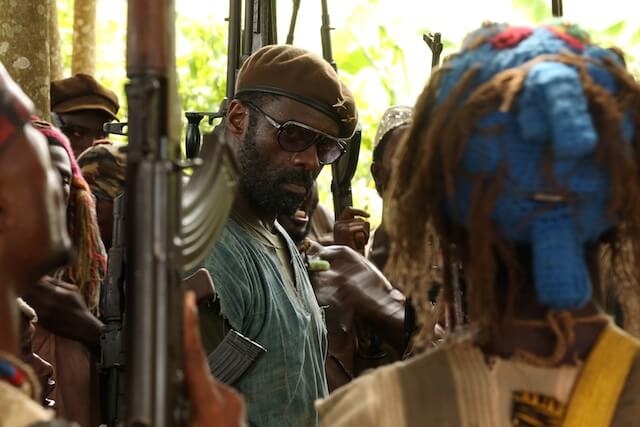‘Beasts of No Nation’ “Beasts of No Nation,” a movie about African child soldiers starring Idris Elba as a psycho military leader, is exactly what you’d expect from a movie about African child soldiers starring Idris Elba as a psycho military leader. It offers no shocking or even novel insights about what makes a small boy take up arms. Elba, as you would no doubt imagine, is both frightening and charismatic as a man who sways the young into his questionable charge. You don’t have to know anything about child soldiers in Africa to predict every story turn. Despite being based on a novel, by Uzodinma Iweala, it plays like it was written by someone who half-remembers something he read in The New Yorker that one time. It should be more than this. After all, it’s the latest from an acclaimed filmmaker, Cary Fukunaga, who helmed “Sin Nombre” and the Mia Wasikowska “Jane Eyre” before achieving cinephile god status for directing the entire first season of “True Detective.” Fukunaga is a world traveler whose films make microcosms — Mexican criminals, sinister pockets of Texas, harsh and overcast England — seem alive and mysterious. His work combines documentary-like observance with clean technique. He likes simple, bold images. Failing that, he likes overly complicated long takes that make viewers squee. RELATED: “Room” finds a striking way to show trauma from a child’s view The simplicity of “Beasts of No Nation” — where not even the country is ID’d — should be a plus, not a negative. It should be a foundation for him to create a damnation of all wars, of all places where ultraviolence and inhumanity rule the day. Our hero is Agu (Abraham Attah), an ordinary boy growing up an in ordinary village. When it and his family are massacred, and over a misunderstanding, Agu wanders the jungle until he’s lured into the army led by Elba’s oft-open-shirted Commandant — a ranting, raving but magnetic monster who’s seen too much footage of Idi Amin (or is written by someone who has). From there we get the obvious beats. Agu will hesitantly kill an innocent man. Agu will use big weaponry like boys would toy guns. Agu will blankly wander about Boschian hellscapes firing semi-discriminately. Agu will lose a friend and become disillusioned. The wild card is Elba’s Commandant (as with the country, he’s never named — just “Commandant”). War has hollowed him out just as its given him purpose and power. He thrives on the pull he can command, and he knows he can rope in pint-sized soldiers by playing father figure, thereby wielding their unfocused anger for his own devices. But who are we kidding? Even Commandant is a stock element — a generic device (see: no name) who never seems real, despite all Elba’s howling and spittle. At one point he returns to HQ and gets undermined by a horrified pol, revealing he’s far lower in the ladder than he lets on, and interchangeable with who knows how many other military leaders. That he’s all bluster is itself a cliche. He fits right into the world of blanks. Again, we should think of the cliches and the simplicity as a way for Fukunaga to work his magic. It should be like (and is clearly indebted to) the Russian grinder “Come and See,” another hallucinatory look at a child adrift through war, with fits of “Children of Men” you-are-there set pieces. There are prowls through horrorshows, the greens of the jungle mixing with crimson red. The camera stares dead eyed in long takes at casual slaughter while Brian Eno-knockoff soundscapes try to mourn the bloodshed. But it’s too easy to get distracted by how basic everything is when people aren’t shooting, when they’re hanging at base camp and still not doing anything that might surprise even someone who doesn’t pick up a newspaper now and then. Perhaps Fukunaga himself sets us up to expect something at least craftier. The opening shot is through a bombed out television set, which Agu and friends use to feign TV programs, even leaping out of the front to demonstrate their own “3-D.” But nothing that follows is as inspired or as satirical — just exactly what you’d expect, almost to the second, right down to its banal and possibly insincere conclusion. Even the TV set opening backfires, suggesting all we’re seeing is a mere aestheticization of real-life horrors. One doesn’t want to assume Fukunaga is only using this for awesome shots. But compared to something like Steven Soderbergh’s “Che,” another film in which a filmmaker dropped into a world he didn’t know and found the film, it lacks shape and purpose. It’s as though Fukunaga came away learning nothing but what he knew going in. He’s a great technician but not yet a great artist.
Director: Cary Fukunaga
Stars: Abraham Attah, Idris Elba
Rating: R
2 (out of 5) Globes
‘Beasts of No Nation’ is a relentlessly unsurprising child soldier saga

Netflix
Follow Matt Prigge on Twitter @mattprigge


















